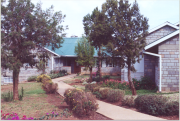
Myanmar (MNN) — It's been nearly
four months since Cyclone Nargis devastated Myanmar.
According to the United Nations,
the storm's wrath left 138,000 people dead or unaccounted for and 800,000
homeless. The fragile infrastruction of
what used to be SouthEast Asia's "rice bowl" collapsed under tremendous winds and a storm
surge that resembled a tsunami.
Today, vast tracts of land remain
a sodden ruin, haunting the potential for enough food in the coming
months.
Charles
Debter with
Global Aid Network says their team is responding to the immediate needs and the future
without a harvest. "We have been
able to ship food to Myanmar and are working with partners there to get it
into the country and distribute it out into the Irrawady River Delta."
Agreements are in place to allow Global Aid Network to assume the leadership toward helping six villages with a
combined population of about 30,000 people who continue to face desperate
conditions. Debter says they're "helping
to build six schools and houses. Two of them have been completed. In early August , the first one of those was
officially presented to the Myanmar Ministry of Education." School supplies were also given through a
backpack project for the students who will begin attending the schools in the
fall.
But new schools and new homes
aren't enough. Many of the farmers lost
their water buffalo– their only means of planting the rice fields. With the planting season rapidly drawing to a
close, there will be a scant harvest if planting doesn't take place soon, which will
complicate the food crisis.
Global Aid is also trying to
supply farm implements to help plant the fields. For about $2,000 it is possible to purchase
and provide a simple tractor that is very much like an over-sized, motorized
tiller. These are available, and Global Aid Network would like to provide a minimum of five of these tractors in each of the six
villages where this ministry is focusing its assistance efforts. Therefore, to
provide 30 tractors, $60,000 is needed as soon as possible to provide for the
purchase and delivery of these farming implements.
Food, shelter, and education are
good, but none of that addresses the vastly-polluted waters since the disaster
floods. Bodies still float in the main
waterways, making it unsafe as potable sources. Global Aid helped address this by training
with local church communities to set up water filtration systems in the
area.
Debter says actions speak
louder than words at times like these. "When you're caring for the needs of an
individual–the whole person, and that is shown–it's demonstrated, you're
really being an open witness of the good news of Christ."

